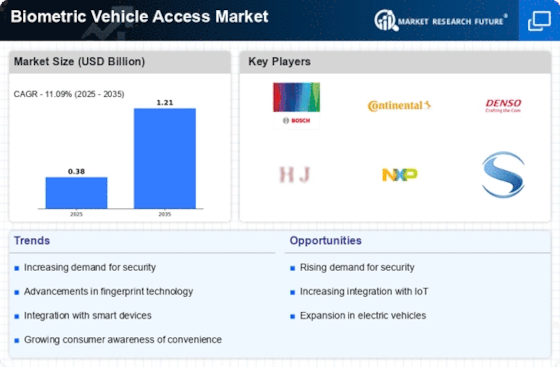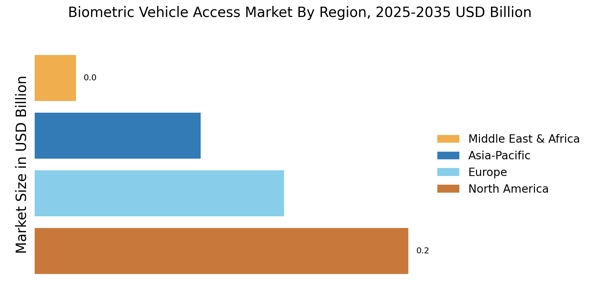Rising Security Concerns
The escalating concerns regarding vehicle security are significantly influencing the Biometric Vehicle Access Market. With the rise in vehicle theft and unauthorized access incidents, consumers are increasingly seeking advanced security solutions. Biometric systems, which utilize unique physical characteristics for access, offer a higher level of security compared to conventional keys or fobs. According to recent studies, biometric systems can reduce unauthorized access by over 50%, making them an attractive option for vehicle manufacturers and consumers alike. This heightened awareness of security risks is likely to drive the adoption of biometric technologies in vehicles, as consumers prioritize safety and protection of their assets.
Technological Integration
The integration of advanced technologies into the Biometric Vehicle Access Market is a pivotal driver. Innovations such as artificial intelligence, machine learning, and enhanced biometric sensors are transforming vehicle access systems. These technologies not only improve security but also enhance user experience by enabling faster and more reliable access. For instance, the implementation of facial recognition systems has shown a potential increase in access speed by up to 30% compared to traditional methods. As these technologies continue to evolve, they are likely to attract more consumers, thereby expanding the market. Furthermore, the increasing adoption of smart vehicles is expected to further fuel the demand for biometric solutions, as consumers seek seamless integration of their vehicles with personal identification methods.
Increased Investment in R&D
The surge in investment in research and development within the Biometric Vehicle Access Market is a significant driver of growth. Companies are allocating substantial resources to develop cutting-edge biometric technologies that enhance security and user experience. This investment is crucial for advancing the capabilities of biometric systems, such as improving accuracy and reducing false acceptance rates. Recent data suggests that R&D spending in this sector has increased by over 25% in the past year, indicating a strong commitment to innovation. As companies continue to push the boundaries of biometric technology, the market is expected to witness a proliferation of new products and solutions, further driving consumer interest and adoption.
Regulatory Support and Incentives
Regulatory support and incentives play a crucial role in shaping the Biometric Vehicle Access Market. Governments are increasingly recognizing the importance of advanced security measures in vehicles, leading to the establishment of regulations that promote the adoption of biometric technologies. For instance, certain regions have introduced incentives for manufacturers who implement biometric systems in their vehicles, thereby encouraging innovation and investment in this area. This regulatory landscape not only fosters growth but also enhances consumer confidence in biometric solutions. As regulations evolve, they are likely to create a more favorable environment for the expansion of the biometric vehicle access market, driving further adoption among manufacturers and consumers.
Consumer Preference for Convenience
The growing consumer preference for convenience is a notable driver in the Biometric Vehicle Access Market. As lifestyles become increasingly fast-paced, individuals are seeking solutions that simplify their daily routines. Biometric access systems provide a seamless experience, allowing users to unlock and start their vehicles without the need for traditional keys. This convenience is particularly appealing to tech-savvy consumers who value efficiency. Market data indicates that nearly 60% of consumers are willing to pay a premium for vehicles equipped with biometric access features. This trend suggests a strong potential for growth in the market, as manufacturers respond to consumer demands by integrating biometric technologies into their offerings.
















